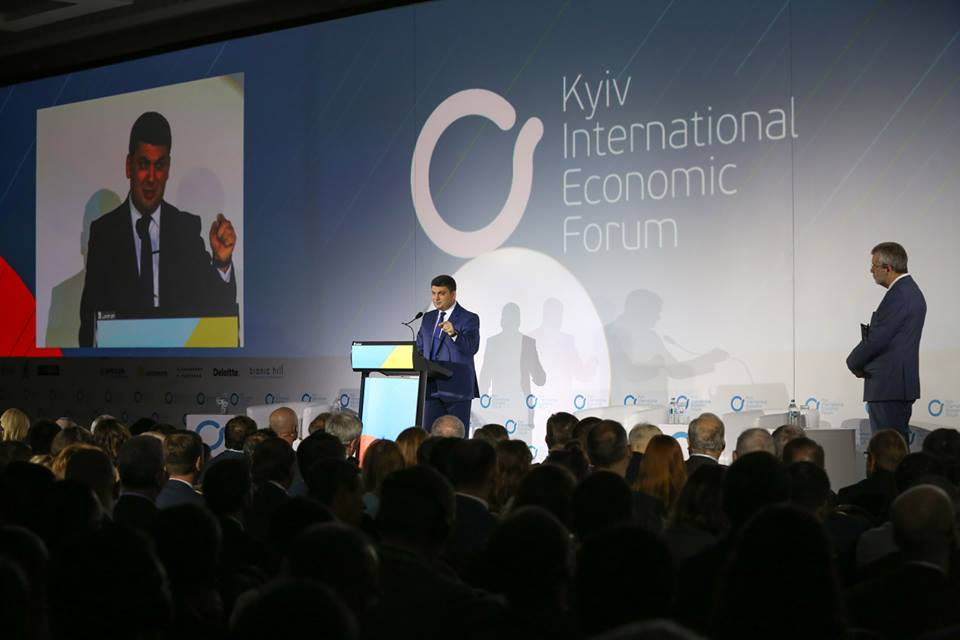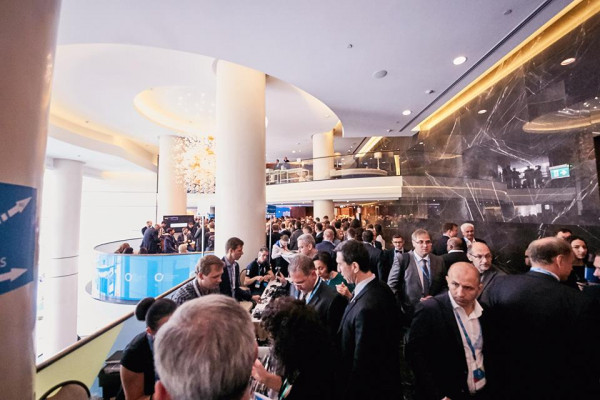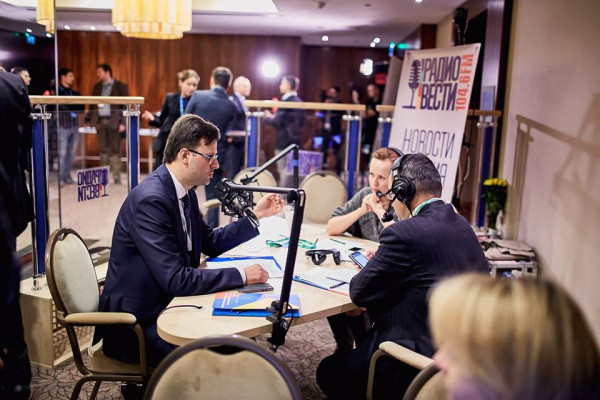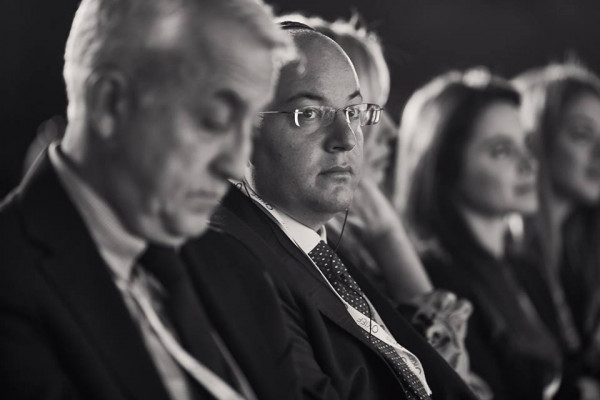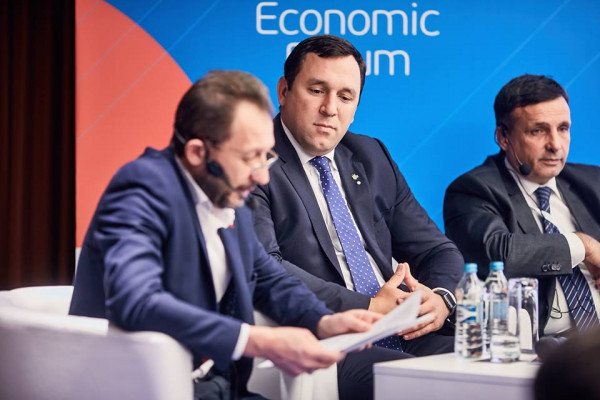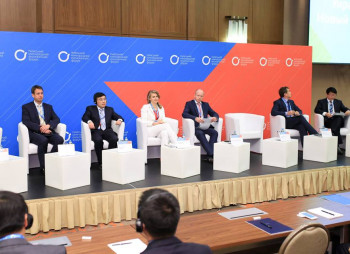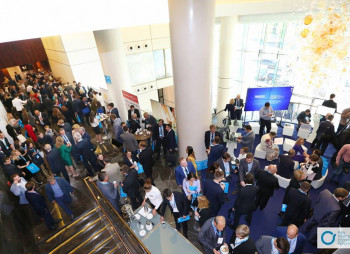In general, the atmosphere of the forum looked like open debates – with lots of thorough review of modern trends in different parts of the world, advice for Ukrainian economics and politics, as well as sharp and unveiled critics from the audience. It was lively, hot, and well-organized.
It is important to emphasize who had participated, so that to treat the given advice respectively. These people changed countries and approaches in transitional economies, like Chile, Poland, Turkey, Israel, India, as well as those who deliver processes in the EU and Ukraine.
Such extra ordinary characters participated in the two days event in Kyiv, like Nobel Prize Winner Dan Schechtman from Israel Institute of Technology; Cristian Danielson, the Director General for Enlargement at the European Commission in Brussels; Grzegorz W. Kolodko, a former Deputy Prime Minister (1994 – 1997) and Minister of Finance of Poland (2002-2003); Garry Jacobs, the CEO of World Academy of Art and Science; Erik Reinert, Professor Technology Governance and Development Strategies at Tallin University of Technology; Sevki Acuner, EBRD director in Ukraine; Phillipe Trautman, HPC & POD Sales Director, EMEA Hewlett Packard Enterprise; Frank Jansky, chief of German Regional Currencies Association; Guillermo Arthur, President of the International Federation of Pension Fund Administration (FIAP); Peter Lindholm, Innovation Policy Adviser, World Banks; Jonathan Pacifici, General Partner of Wadi Ventures; Orhan Comlek; General manager of Tubitak Marmara Technopark; Zhang Zhonghua, Vice-president of one of Chinas leading construction and investment companies of Anhui Foreign Economic Construction (Group) Co., Ltd.
These are a few to mention along with Ukrainian PM Volodymyr Groysman and Ukrainian businessmen and politicians, so that not to diminish the honor of those who kindly agreed to visit Kyiv and participate in the conference. These are people I have heard speaking at the many panels of Kyiv International Economic Forum for two days, and certainly some key speakers are missing. So, let’s review the key notes taken.
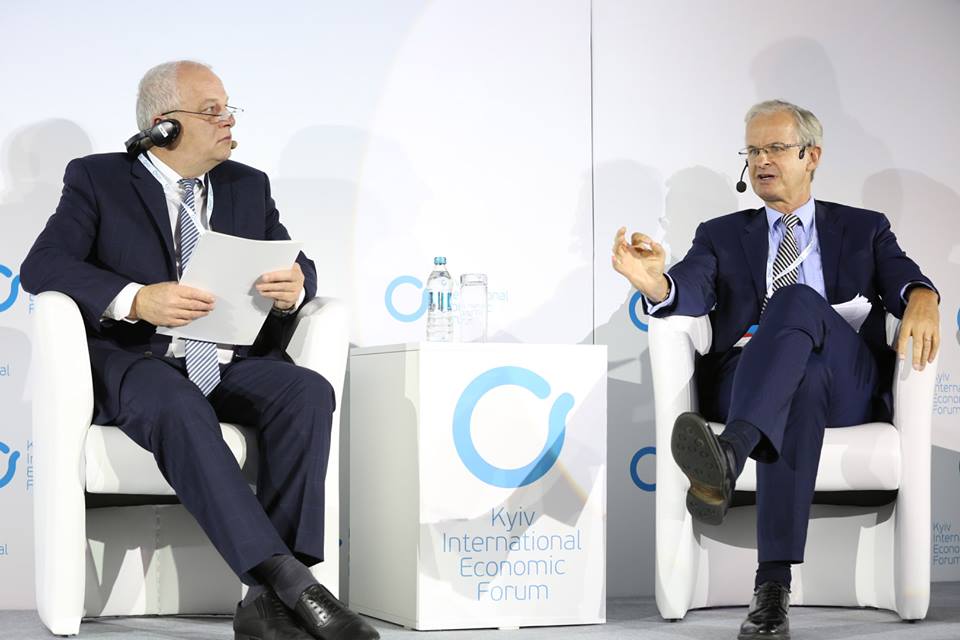
The driving force of transformation is efficiency. At this, Ukraine has to exploit advantages, like the DCFTA agreement with the EU enabling to export to the EU although not being the EU member state. At this, Ukraine must actively take part in the Horizon 2020 fund or the EBRD facilities for the SME (small and medium enterprises).
Almost all speakers emphasized the importance of Ukraine’s human capital which is well-educated and has to be involved in the transformation of the country. Encouraging environment has to be created to bolster creativity and developments. Meantime, it is clear that certain issues of predictability in economics and law have to be established by tackling corruption. Corruption in plain terms was described as money flows channeling into/via state bodies with certain pools on the way forward, where officials coming into power draw their interest.
Meantime, Ukrainian public officers voiced concerns that population does not trust the lofty ranks at large. So, the issue of establishing credibility has been of the primary importance.
The general concepts of adding value, industrial development, involvement of high tech and diversifying of exports were heard everywhere.
The foreign participants explained that the gap between government and citizens may be filled by individuals or volunteers, as well as multinational corporations. These are individuals who make youtube tutorials, or organize crowd funding for solutions generated by regular members of communities, or those who change approaches in crediting and circulation of currencies. In this way, communities are driving out to become effective. The government can only create climate for these individuals so that community may become effective, or/and attract multinational corporations who bring technology and order.
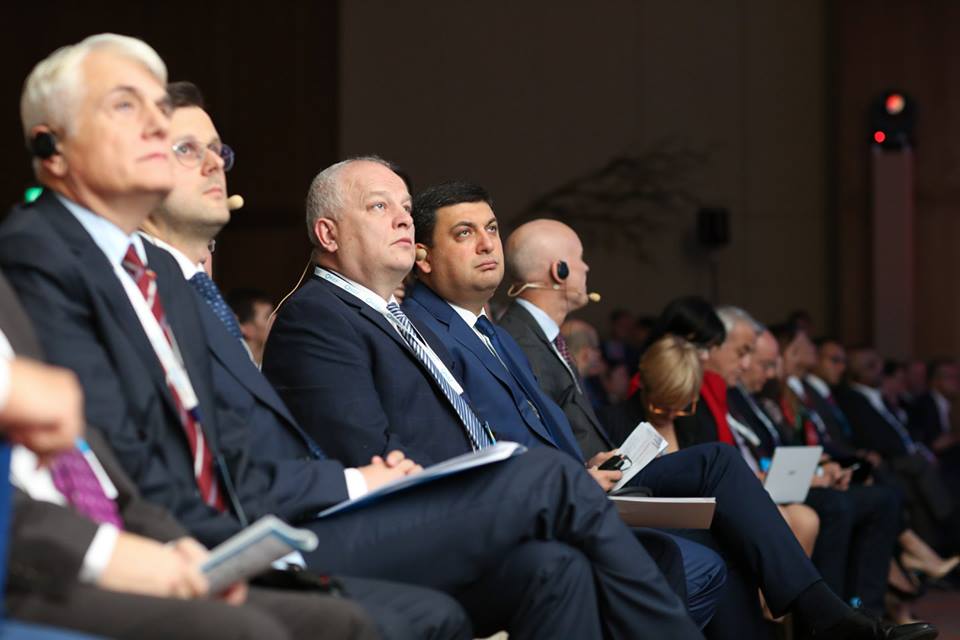
Also, it has been evident that Ukrainian government fails to deliver messages about the undergoing reforms to the public and world community at large. For sure, the implementation comes after the reforms, but lack of transparent and positive publicity influence perception of Ukraine as a business country.
Outstandingly, many proposed to go beyond GDP related talks. Social cohesiveness, capital, ecology and globalization have to be in scope of modern politicians and economists. Ukraine has to drive toward openness getting rid of protectionism or xenophobia. Ukraine has to stay where it is between the East and West, and start looking for markets not only in Western directions but also capture large markets of Turkey, India, and China.
For sure, there has to be a certain level of political will so that to establish PPP (Private Public Partnerships) or launching a local bank for reconstruction and development aiming at creating jobs and attracting investments.
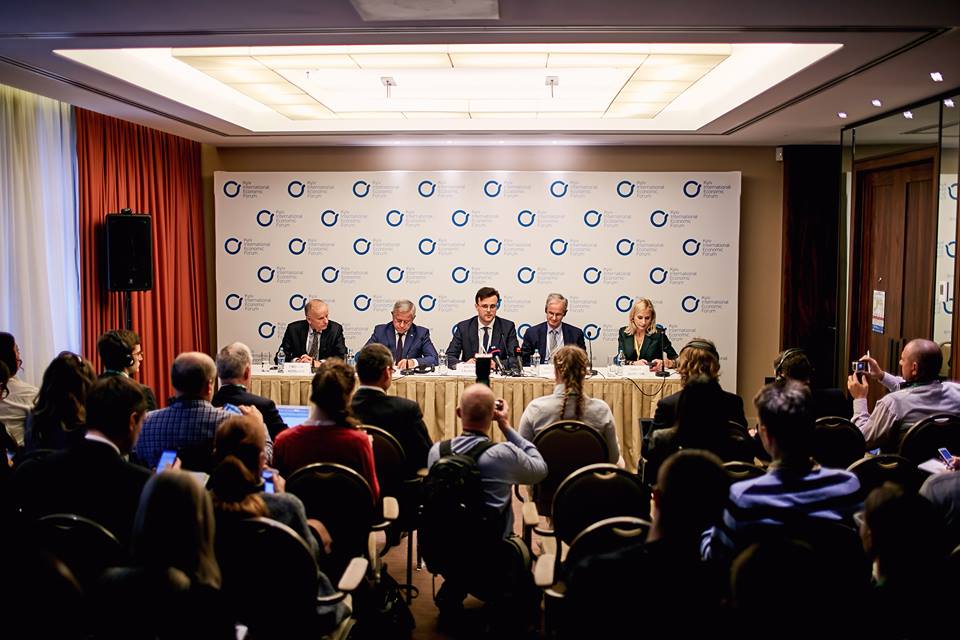
In H1/2016, Ukraine exported up to 70% in commodities, while export of machine building contracted significantly to 10% of the country’s exports.
Foreign speakers encouraged to decentralize monetary system and enable cryptocurrencies to come into circulation, or let regional currencies appear to fight unemployment, as it is in several regions of Switzerland and Germany; also in Austria, and the Netherlands there are communities who manage to launch regional currency projects. Such two currencies in circulation proved to be helpful for leveling the up and downs of fiscal and monetary tools of effecting the economy.
On the other hand, free economic zones may contribute to economic growth in Ukraine, but experts believe that the country has to think of something new and more particular to Ukraine. Mr. Halasiuk, Chairman of the Parliamentary Committee on Industrial Policy and Entrepreneurship in Ukraine claimed that he was about to present a draft law in the parliament to let foreign jurisdiction become applicable in special economic zones. In some respect, there is no need to create old things available over the globe. In the world, there are 4 000 techno parks; more than 80% of them are non-profit institutions, as the general manager of Tubitak Marmara Technopark in Turkey put it. At this, Ukrainian businesses acknowledge that the exclusive economic zones have to be in place, so that some vehicles of attracting investments into Ukraine become available in line with the best world practices.
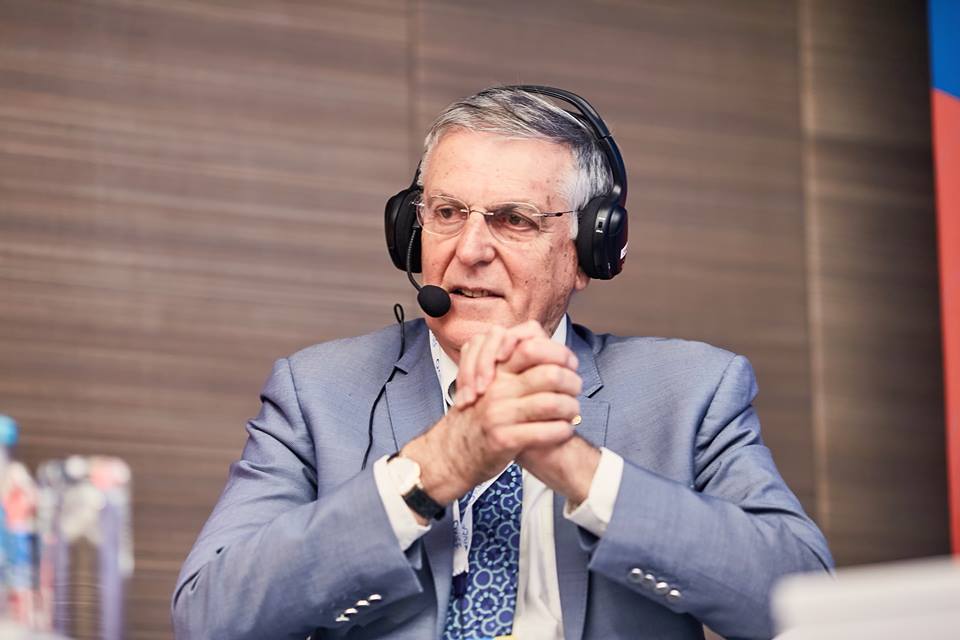
Photo of Nobel Prize Winner Dan Schechtman
The IT conference has become one of the most comprehensive mainly due to the present time reality that IT serves a back ground for other industries going on in combos with the IT achievements.
The success of IT industry in Ukraine can be of an example for others. It means that every industry can find its niche on world markets, as IT industry of Ukraine did. We have to be aware that globalization is taking its pace and the forth industrial revolution is about to change the benchmarks in societies. At this, even in IT Ukraine mainly delivers outsourcing for the US, the EU or Israeli companies, not to mention a few of successful stories like of Looksery. To compare, the IT venture capital amount to yearly USD 400mln in Ukraine, while in Israel it worth billions. Deriving from the speech of Jonathan Pacifici, General Partner of Wadi Ventures, it is all about trust in investing. He said that Israel had had no prior experience in automotive industry, but a few guys from his ventures started to provide services to world automobile majors.
Selectivity is important so that not to dump money. There have to be evaluating tools and procedures. At this, you have to do the basics - speak English at an appropriate level though and in a manner pertinent abroad, said Nobel Prize Winner Dan Schechtman. He elaborated on the issue explaining that business culture has to become a norm when the CEO supports initiative or creative thinking by providing financing or establishing partnerships with engineers or other personnel. There should be some success stories to share with the world. The speakers told that future shareholders of Ukraine are those people who think of future and they are coming to capture their share very soon.
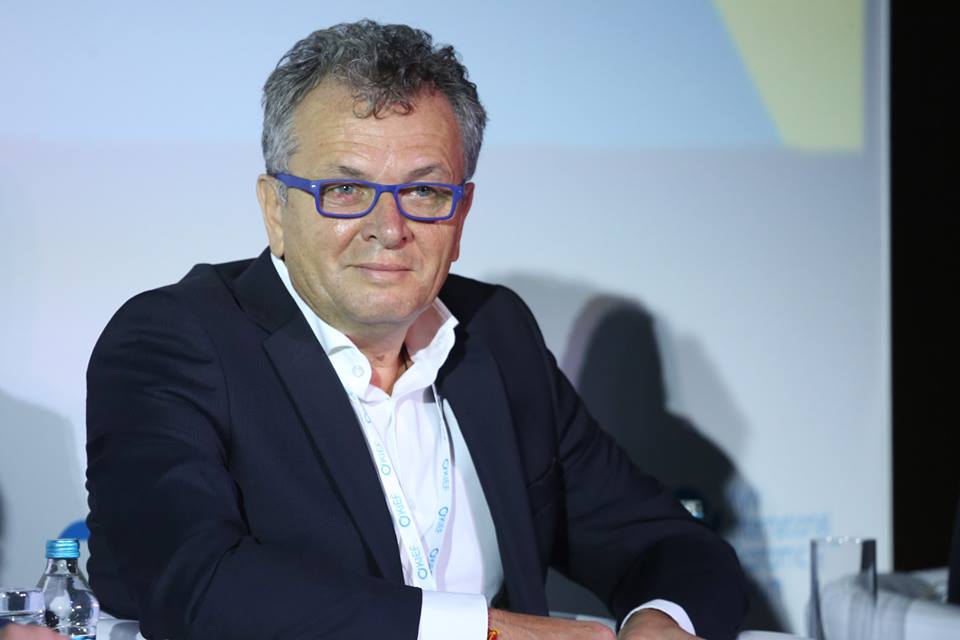
Photo of Ukrainian businessman, founder of IT related KM Core holding
Here is a list of technologies which are shaping the modern world, according to Eugene Utkin from KM Core holding.
- Cloud Computing
- Mobile Devices
- IoT platforms
- Location Detection Technologies
- Advanced Human Machine Interface
- Authentication and Freud Detection
- 3D Print
- Smart Sensors
- Big Data Analytics and advanced algorithms
- Multilevel Customer interaction and customer prodding
- Augmented realities
Phillipe Trautman, HPC & POD Sales Director emphasized the importance of high performing computing which is about speed and size for innovations enabling to visualize and make projections. In this, respect Ukraine is really under equipped.
As Americans like to say, take disadvantage and make advantage of it. And being said, human capital is the most valuable factor input, so consider this in the first place!


